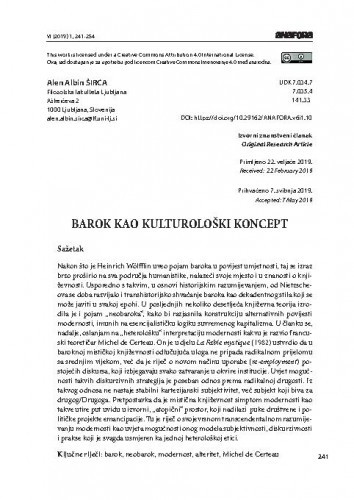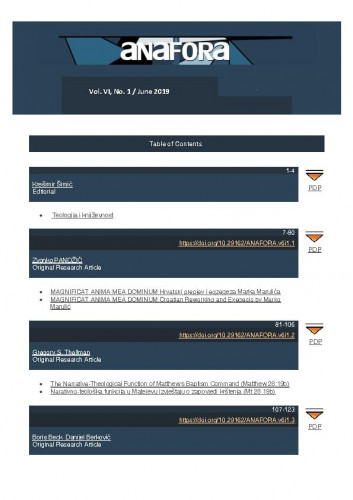Nakon što je Heinrich Wölfflin uveo pojam baroka u povijest umjetnosti, taj se izraz brzo proširio na sva područja humanistike, nalazeći svoje mjesto i u znanosti o književnosti. Usporedno s takvim, u osnovi historijskim razumijevanjem, od Nietzscheova se doba razvijalo i transhistorijsko shvaćanje baroka kao dekadentnog stila koji se može javiti u svakoj epohi. U posljednjih nekoliko desetljeća književna teorija izrodila je i pojam „neobaroka“, kako bi razjasnila konstrukciju alternativnih povijesti modernosti, imunih na esencijalističku logiku suvremenog kapitalizma. U članku se, nadalje, oslanjam na „heterološku“ interpretaciju modernosti kakvu je razvio francuski teoretičar Michel de Certeau. On je u djelu La Fable mystique (1982) ustvrdio da u baroknoj mističkoj književnosti odlučujuća uloga ne pripada radikalnom prijelomu sa srednjim vijekom, već da je riječ o novom načinu uporabe (re-employment) postojećih diskursa, koji izbjegavaju svako zatvaranje u okvire institucije. Uvjet mogućnosti takvih diskurzivnih strategija je poseban odnos prema radikalnoj drugosti. Iz takvog odnosa ne nastaje stabilni kartezijanski subjektivitet, već subjekt koji biva za drugog/Drugoga. Pretpostavka da je mistična književnost simptom modernosti kao takve utire put uvidu u izvorni, „atopični“ prostor, koji nadilazi puke društvene i političke projekte emancipacije. Tu je riječ o svojevrsnom transcendentalnom razumijevanju modernosti kao uvjeta mogućnosti onog modela subjektivnosti, diskurzivnosti i prakse koji je svagda usmjeren ka jednoj heterološkoj etici.; After Heinrich Wölfflin introduced the notion of Baroque in the history of art, the term rapidly expanded to all areas of humanities, including the realm of literary studies. In parallel with this historical understanding, the transhistorical understanding of Baroque as a decadent style that can occur in every epoch was developing, at least from Nietzsche’s era on. In the last decades, literary theory has developed the term “Neo-Baroque” in order to clarify the construction of alternative histories of modernity that would be immune to the essentialist logic of modern capitalism. In the article, I draw on the “heterologic” interpretation of modernity developed by the French theoretician Michel de Certeau. In his work La Fable mystique (1982), he argues that Baroque mystical literature does not establish the radical rupture from the Middle Ages, but rather a new mode of uses (re-employment) of existing discourses, which avoids any closure within the frames of institutions. The precondition of such discursive strategies is a special relationship to radical alterity. Such a relationship does not foster stable Cartesian subjectivity, but rather a subject that is for the other/Other. The assumption that mystical literature functions as a symptom of modernity in general paves the way to an insight into the originary, “atopic” space that goes beyond the mere social and political projects of emancipation. What is at stake here is a kind of transcendental understanding of modernity as a condition of the possibility of the subjectivity, discursiveness and practice, which are focused on a heterological ethics.
Sažetak

 Anafora : časopis za znanost o književnosti = [academic literary journal] : 6,1(2019) / glavni i odgovorni urednik, editor-in-chief Ružica Pšihistal.
Anafora : časopis za znanost o književnosti = [academic literary journal] : 6,1(2019) / glavni i odgovorni urednik, editor-in-chief Ružica Pšihistal.